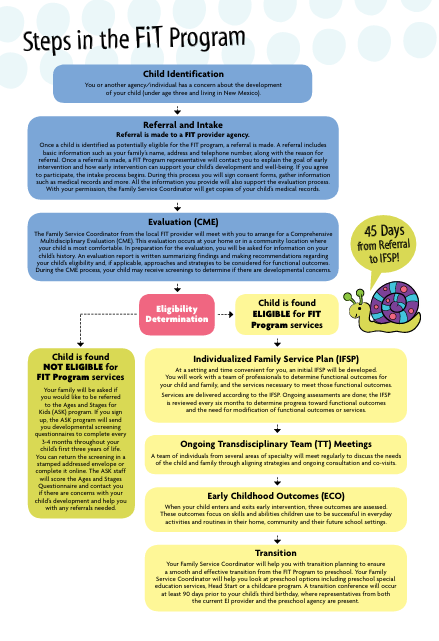
Steps In The Process
One Step At A Time
When parents identify a child as possibly eligible for the FIT program and make a referral, a FIT Program representative will reach out to discuss how early intervention can support the child's well-being.
Refer to the image in this section for a visual representation of the various steps in the early intervention process. You can find more information below or contact us if you have any questions.
1. Child Identification
You or another agency or individual may notice concerns about your child’s development (under age three and living in New Mexico).
2. Intake
After identifying your child as potentially eligible for the FIT program, someone will make a referral. This referral includes basic information such as your family’s name, address, telephone number, and the reason for the referral. Once you submit the referral, a FIT Program representative will contact you to explain the goals of early intervention and how it can support your child’s development and well-being. If you choose to participate, the intake process will begin. During this process, you'll sign consent forms and gather information such as medical records to support the evaluation process. With your permission, the Family Service Coordinator will obtain copies of your child’s medical records.
3. Evaluation (CME)
The Family Service Coordinator from the local FIT provider will meet with you to arrange a Comprehensive Multidisciplinary Evaluation (CME). This evaluation will occur in your home or a community location where your child feels most comfortable. To prepare for the evaluation, you will provide information about your child’s history. An evaluation report will summarize the findings and recommend whether your child is eligible, along with approaches and strategies for achieving functional outcomes. During the CME process, your child may undergo screenings to identify any developmental concerns.
4. Individualized Family Service Plan (IFSP)
At a time and place that works for you, you and a team of professionals will develop the initial IFSP. This plan will determine functional outcomes for your child and family along with the services necessary to achieve those outcomes. Services will be delivered according to the IFSP, and ongoing assessments will take place. The team will review the IFSP every six months to evaluate progress toward the functional outcomes and determine any need for modifications.
5. Ongoing Transdisciplinary Team (TT) Meetings
A team of professionals from various areas of specialty will meet regularly to discuss your child’s and family’s needs, aligning strategies and providing ongoing consultation and co-visits.
6. Early Childhood Outcomes (ECO)
When your child enters and exits early intervention, the team will assess three outcomes. These outcomes focus on the skills and abilities children use to succeed in everyday activities and routines at home, in the community, and in future school settings.
7. Transition
Your Family Service Coordinator will assist you with transition planning to ensure a smooth move from the FIT Program to preschool. They will help you explore preschool options, including preschool special education services, Head Start, or childcare programs. A transition conference will occur at least 90 days before your child’s third birthday, involving representatives from both the current early intervention provider and the preschool agency.
